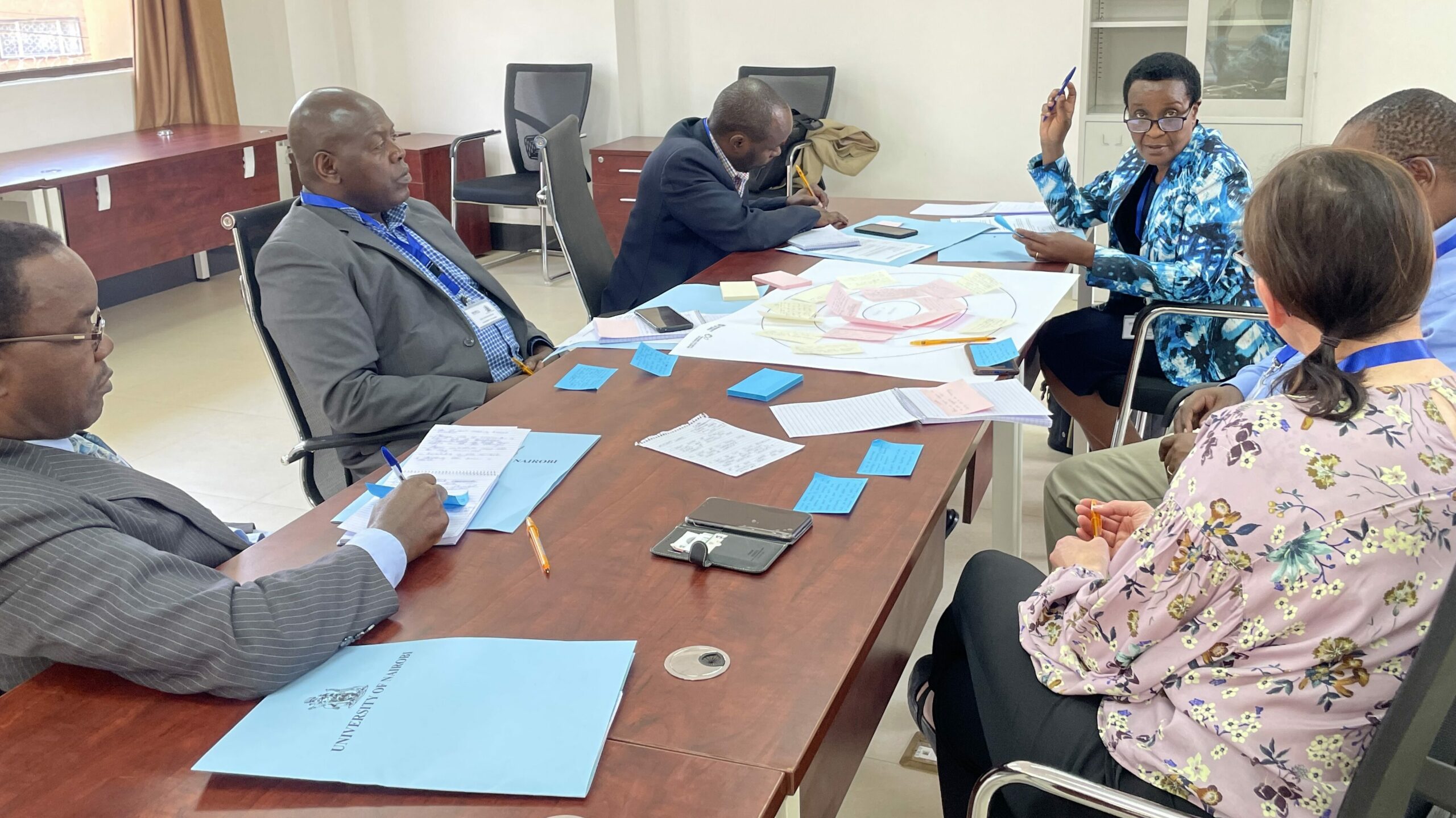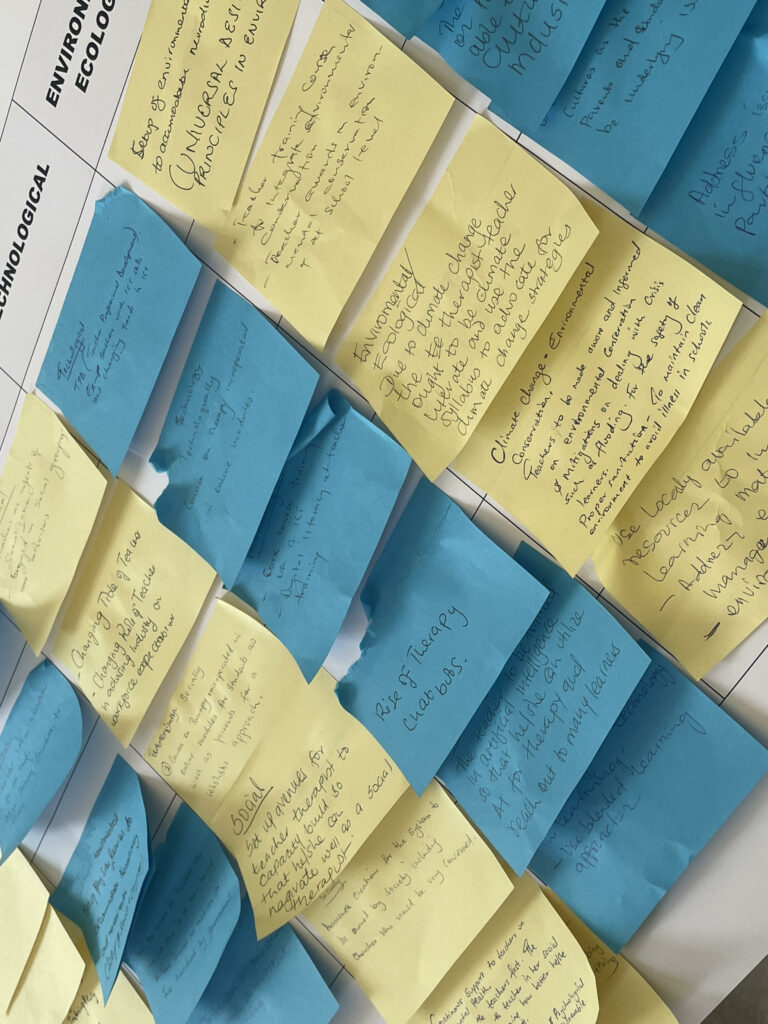
In Kenya, the Competency Based Curriculum (CBC) was launched for basic education in 2017, and is now being considered in higher education institutions and teacher education. To address a changing educational landscape and Sustainable Development Goals (SDGs), it is important to explore how educational policy, structures and curriculum design support education and learning – as well as affect teacher education and learning practice. So, how can universities, teachers, as well as policy actors then already gear and prepare for such changes?
This motivated a one-day futures workshop with over 40 participants at the University of Nairobi, on 17October 2023 in Nairobi, Kenya. With participants from the Kenyan educational sector, and two Kenyan universities, Strathmore University and the University of Nairobi, Kenyan educational experts, teachers and students stopped to think together what kinds of emerging issues are shaping the future of education and learning in Kenya, or could shape it in the future.
What are “futures workshops”?
Futures workshops are a practical tool, as an analytical set-up, where participants are allowed to leave the present moment, and to think and investigate about the possibilities that the future beholds. Such methods, or their combinations, can be concretely brought into educational planning to assist more conventional tools, such as roadmapping, strategic planning or crafting concrete action plans.
Facing the future – neither magic, nor about prediction
In the University of Nairobi, the participants engaged with futures through collective dialogue, were tasked to map and analyse emerging issues, and their different types of impacts. In such work, both opportunities and risks can be scanned, and by exploring them, it is possible to think of diverse outcomes. Through joint sessions in the conference room and group work in the smaller class rooms, it was necessary to think how educational structures and curriculum design should react to these potential changes.
Recent years, with all their disruptions, have shaken our beliefs of what is possible, and also opened up future possibilities. With the COVID-19 pandemic, remote learning and related technological solutions were rapidly taken up. Into the realm of alternative futures, as some would say, to leapfrog into a new world, and these impacts are felt in Kenya as in Finland alike. With the year 2023 coming to an end, discussion on the most purposeful means to organise education has not stopped – on the contrary. In both countries, technological solutions and mobile-based infrastructures are to stay, also enabling distance learning environments in a way that previously was not possible. How to then transfer the quality, intimacy and deep interaction of traditional classrooms, and most of all, the element of human touch?
With the digital transformation, there are already expectations of further developments. Concerning machine learning and artificial intelligence (AI), ChatGPT is raising the eyebrows also of Kenyan educators, posing further questions how students, interested in these tools, should be assisted, followed and supported. In the headwinds of technology, education still has its primary objective for equipping students with capacities to navigate a changing world, and even more importantly, to assist them in providing solutions to the many global challenges around them.
Equally, far in the future, who knows with which languages education will be delivered. In opening up to futures, university teachers, educational planners and diverse stakeholders also can become more aware of their assumptions held of the future.

Humans at the heart of learning
As teachers well know, students come from multiple backgrounds, life histories and circumstances, and also carry different values. Such questions could also concern students at Kenyan universities, and at other educational levels.
For an educator, this also means attending to particular needs, and supporting learner well-being. Addressing mental health was an issue raised in the workshop, where psycho-social causes could stem from multiple sources, which has to be increasingly recognised. This also means delving deeper into the different reasons that burden different learners.
Image: The generation of new ideas, and discussing them in systematic fashion, as a basis for addressing the future, is one of the elements at a futures workshop.
As education aims to become even more learning-centred, also in the future, teachers and their capacities are in a key role, when assigned with the responsibility of organising and designing classes, and meaningful learning environments for eager students. For this, teachers will inevitably need support to avoid a risk of diluted learning and rather, to make the most of newly-surfacing possibilities.
Like voiced by the Kenyan educators, nurturing the human being will hardly lose relevance – on the contrary. As food for thought also for the Global North actors, it is necessary to remind ourselves of any type of technology being an enabler.
In rich discussions concerning the future of education, and its alternatives, the aim was to nurture the systemic understanding of the participants to orient to the future. As an attempt to generate futures knowledge, one also attends to the first signs of changes already observed in the present.
Way forward
After “a bath of futures thinking,” related exchange as well as research around the changing educational landscapes continues. The generated insights are a starting point for further discussions, to be used by the Kenyan actors in the educational sector, and also can aid the design of new initiatives or policy-level actions.
As the Competency Based Curriculum (CBC) is taking steps forward in Kenya, it has to align with the changing world. The task of education, and the role of educators also in the future will be to assist students to meet learning goals, at whichever course or subject, and equip them with such skills, which should be useful, whichever their future.
This is the aim of foresight and futures thinking, ensuring we do not only address present-day or near-term changes – rather proactively face the future.
About the research project
The futures workshop was organised as part of the “Research-based and future-oriented curriculum review and development for teacher education in Kenya” (REFORD) project by University of Nairobi, Strathmore University, University of Helsinki and University of Turku, which is funded by the University of Helsinki through the Global Innovation Network for Teaching and Learning (GINTL).













